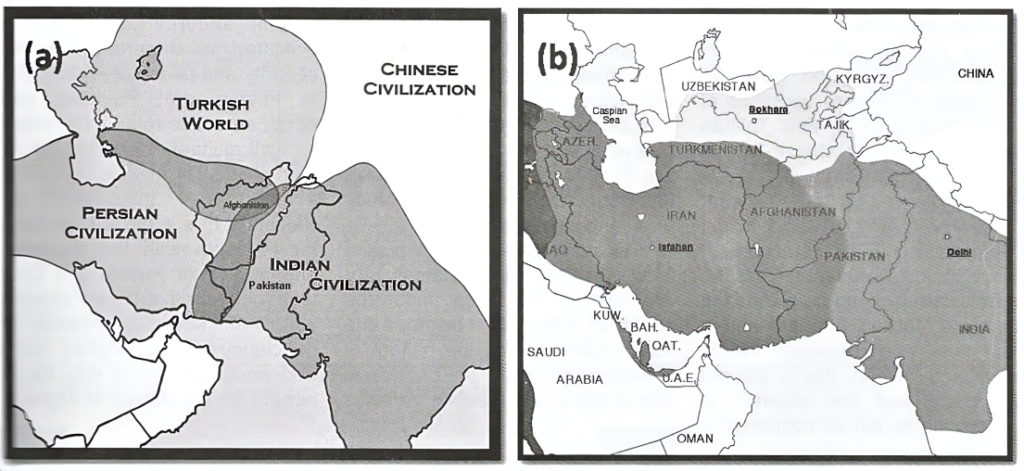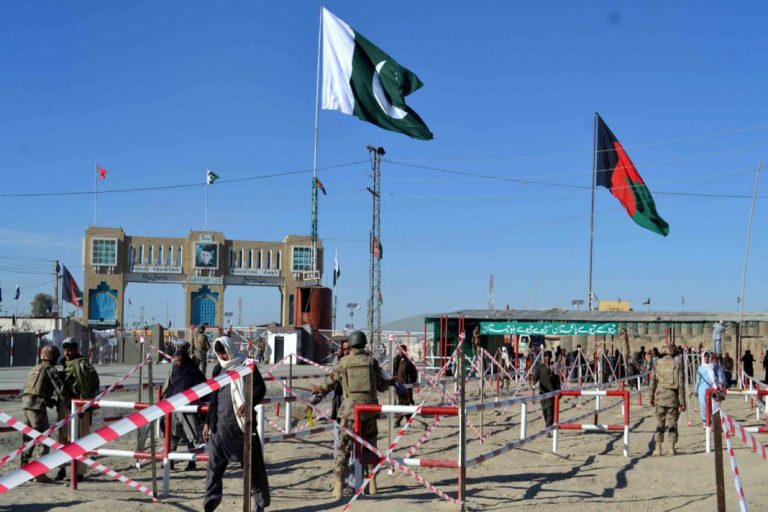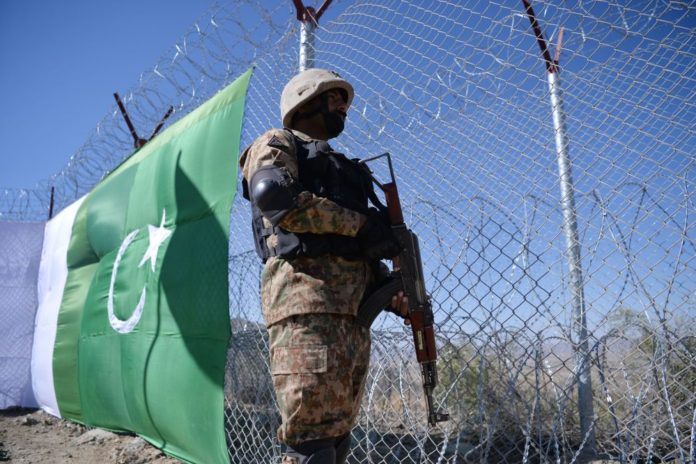Abstract
The hostile relations between Pakistan and Afghanistan are a high security threat for the sovereignty of Pakistan which forced Pakistan to fortify 2240km international border with Afghanistan. The portrayed bone of contention between these two countries is the Durand Line decided by the then ruling Amir Abdur Rahman and Sir Mortimer Durand (British India) in 1893. It was converted into an international border in 1947 when the regional people under British India decided to stay with Pakistan due to Islamic ideological basis. It is of utmost importance for Pakistan to secure its northern border to avoid two front wars. This study is focused on the role of Pakistan in Afghanistan to secure its national and international interests by recognizing the existence of Taliban as true entity and creation of de-escalation zones in Afghanistan. I believe that the peace in Afghanistan is possible by the implementation of one nation two states concept.
Introduction
Afghanistan, also known as graveyard of empires was never a one unit throughout its history. It was and still it is a blend of three civilizations i.e. Persian, Turkish and Indian civilization. After the fall of the Persian empire in medieval era, Afghanistan came under the influence of Ottomans, Safavids and Mughals as can be seen in Figure 1 (a,b).

After the British conquest of the subcontinent, Afghanistan again came under the influence of world powers which split land of Afghanistan between Czarist Russia and British India. Although the rulers of Afghanistan controlled domestic politics but the foreign policy of Afghanistan was under control of British India and Russians.
The modern land of Afghanistan is still under the influence of various world powers. While Bharat is also involved in the domestic as well as foreign politics of Afghanistan China and Russia (again) are also willing to resolve matters in war torn Afghanistan. After the invasion of NATO forces under the banner of global terrorism, the on ground situation is deteriorating rapidly and an object oriented short term invasion has transformed into a battle of iteration. A recent survey revealed that the Taliban are now stronger than ever and they control more than 40% of the land in Afghanistan or at least continue to influence more than 48% of Afghanistan.
Role of Pakistan in modern Afghanistan
Afghanistan, though a Muslim majority country, did not accept the territorial sovereignty of a new born Pakistan in 1947 and even tried to oppose the admission of Pakistan in the United Nation (UN). On the contrary, the policy of Pakistan towards Afghanistan was always on the basis of Islamic brotherhood which is the core ideology for the inception of Pakistan. When the Soviet Union invaded Afghanistan on the call of the Afghan Govt, Pakistan supported the Muslim faction in Afghanistan who wanted to establish an Islamic Afghanistan. With the help of Pakistan and American CIA, the Taliban managed to get rid of the Soviets and established an Islamic Govt, at least in Kabul. There were various other groups at that time who were (controlled by Iran and other countries) fighting against the Red Army solely for control of territory and not for the sake of any Holy War.
After the Taliban came into power Pakistan established good relations with Afghanistan, this was believed to be a very peaceful era in Afghanistan and Pakistan with both states enjoying good trade and bilateral relations. The problem arose when NATO forces invaded Afghanistan and Pakistan that was once helping the Taliban Govt became an ally of NATO forces. This change in policy turned Pakistan into a foe, even then the Taliban did not attack Pakistan openly. This transition gave an opportunity to the enemy states of Pakistan to portray that Taliban under the name of Tehrik-e-Taliban Pakistan (TTP) declared Jihad (Holy war) against state of Pakistan. Bharat, Israel and to some extent Russia were involved in this propaganda against Pakistan.
Pakistan declared herself as the enemy of Taliban and adopted a mediation role between NATO forces and Taliban, this is still not successful and the situation in Afghanistan is out of control after the Taliban’s spring offensive.

Role of Pakistan
Afghanistan and Pakistan share approximately 2240km border which is further distributed between the Taliban and Afghan Govt within Afghanistan. Other factions include Dostums and Massouds which are influenced by the Iranian Govt, they are also contestants of territory in Afghanistan. The current situation due to the presence of ISIS is very dangerous with respect to the security of Pakistan. Pakistan needs an elaborative and object-oriented policy towards Afghanistan, keeping in mind the threat of ISIS, the role of foreign proxies and the personal development of people of Afghanistan. It is also worth mentioning that Pakistan should realize that people living in Afghanistan think differently than the Govt where Pakistan is concerned. It is time for Pakistan to adopt a front line role instead of neutral role and intervene the Afghanistan policy diplomatically and militarily. It is a vital moment for Pakistan to suppress ISIS in Afghanistan than fight with them in Pakistan.
Right now the Indian govt is trying to influence the foreign policy of Afghanistan knowing that the Afghanistan Govt lack the ability to devise their foreign policy. It is also evident from the history of Afghanistan that the foreign policy of Afghanistan was always in foreign hands. Pakistan must realize this deficiency of Afghanistan and play an active role. The Afghan people will welcome Pakistan more than India due to similarities in culture, language and religion.
Pakistan must work out a plan of “one nation two states“ for Afghanistan. The area under the control of Taliban must be made one independent unit on the pattern of independent territory of Kurdistan in Iraq or the United States of America and the area under Govt control should be the second unit. The Govt of Russia, Pakistan and China must devise de-escalation zones on the patterns of de-escalation zones in Syria devised by Russia. This will ensure that other factions i.e. Northern Alliance, etc. cannot initiate an offensive for territorial gain and/or the fight between Taliban and Afghan Govt should be avoided. The Pakistan military should work with the Taliban and Afghan Govt simultaneously to defeat the growing threat of ISIS. The involvement of India can also be considered for the reconstruction and development of Afghanistan.
Conclusions
The security and peace of Pakistan is dependent on the security and peace of Afghanistan. In this regard, Pakistan must adopt an active role diplomatically as well militarily to defeat the foreign proxies in Afghanistan and to avoid their infiltration into Pakistan. It is a great opportunity for Pakistan with the diplomatic intervention of Russia and China to avoid any fight on Pakistan‘s soil. Pakistan must realize the deficiency of the Afghan nation and adopt an active role for the benefit for the people of Afghan.
Recommendations
• Pakistan should assume an active role both diplomatically and militarily.
• Pakistan should convince foreign powers to admit Taliban as an entity.
• Pakistan should work out a plan of one nation two states for Afghanistan. The area under the control of Taliban remains under Taliban control and Govt held area remains under Afghan Govt control.
• Pakistan must intervene in the foreign policy of Afghanistan as Afghans do not know the art of foreign diplomacy as evident from their entire history.




